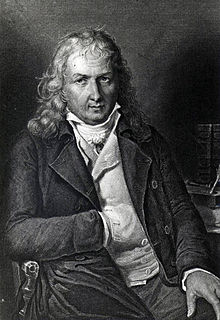A Quote by Jacques-Henri Bernardin de Saint-Pierre
Every trait of beauty may be traced to some virtue, as to innocence, candor, generosity, modesty, and heroism.
Related Quotes
There are two kinds of beauty, one being of the soul and the other of the body, That of the soul is revealed through intelligence, modesty, right conduct, Generosity and good breeding, all of which qualities may exist in an ugly man; And when one's gaze is fixed upon beauty of this sort and not upon that of the body, Love is usually born suddenly and violently.
A spontaneous act of generosity, performed with unselfish grace is an example of moral beauty, as are certain acts of courage; genuine modesty is a possible example, as is selfless love. Although moral beauty is a natural gift, it is nevertheless more likely to emerge and flourish in societies that appreciate and encourage it.
There are no moments more painful for a parent than those in which you contemplate your child's perfect innocence of some imminent pain, misfortune, or sorrow. That innocence (like every kind of innocence children have) is rooted in their trust of you, one that you will shortly be obliged to betray; whether it is fair or not, whether you can help it or not, you are always the ultimate guarantor or destroyer of that innocence.
But there is a beauty every girl has—a gift from God, as pure as the sunlight, and as sacred as life. It is a beauty that all men love, a virtue that wins all men's souls. That beauty is chastity. Chastity without skin beauty may enkindle the soul; skin beauty without chastity can kindle only the eye. Chastity enshrined in the mold of true womanhood will hold true love eternally.
If love is the soul of Christian existence, it must be at the heart of every other Christian virtue. Thus, for example, justice without love is legalism; faith without love is ideology; hope without love is self-centeredness; forgiveness without love is self-abasement; fortitude without love is recklessness; generosity without love is extravagance; care without love is mere duty; fidelity without love is servitude. Every virtue is an expression of love. No virtue is really a virtue unless it is permeated, or informed, by love.






































